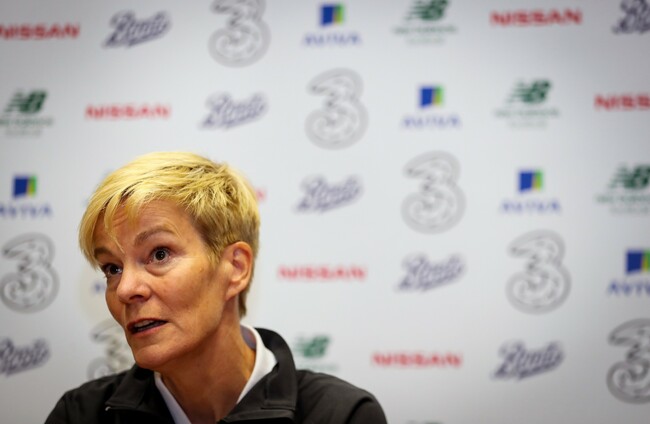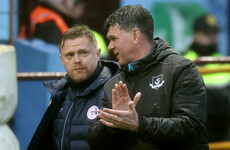VERA PAUW HAS done it all before, and she’s hoping to to it again with Ireland.
It’s no secret at this stage that she transformed Dutch women’s football. Pauw led her native country to the European Championship semi-finals in 2009, this landmark moment epitomising the rise of the women’s game in the Netherlands.
Now one of the leading lights in international football worldwide — the reigning European champions were runners-up at last summer’s World Cup — the now-Girls In Green boss was certainly the driving force behind that upsurge.
Having made a career out of dragging nations further up the ladder, her current project lies in Ireland. The main goal? To lead the national team to a first-ever major tournament.
And they’re within touching distance.
The focus is on Kiev on Friday [KO 5pm Irish time, live on RTÉ 2] where Ukraine stand in their way of qualification. Win or draw the decisive qualifier, Ireland are guaranteed a playoff spot, at least, as Group I’s runners up.
It’s been a rollercoaster campaign so far, one in which Pauw first made her impact felt against this week’s opponents 12 months ago. A massive 3-2 win over the group’s second seeds in front of a record crowd at Tallaght Stadium opened her reign, and she believes things have gone from strength to strength across the board ever since.
“If I look back at where we were a year ago, and where the players are now, you can see that the gap between the Irish-based players and the professionals is getting closer,” she told the media from a training camp in Duisburg yesterday.
“They train so hard, they do so much to get to a level closer to the professionals. You can see that also on the selection. Whenever players are ready, they are in, and when they come in, they do really well.”
One example of such, she says, is 16-year-old Wexford Youths sensation Ellen Molloy: “We invited her back after the Germany game, and she’s doing really well.”
In most interviews she does, Pauw touches on her advocacy of mixed-gender football. It’s the Netherland’s secret to success, first introduced in 1986.
“This is what sets us apart from other countries,” as the 89-time capped Dutch international told Fifa earlier this year. “The outcome was so extremely positive that it opened the door to competitive mixed-gender football throughout the whole pathway of youth players.
“The final step to the under-19 leagues was made at the end of the 90s. It’s just the same for girls or boys. That brought a whole base of knowledge into the squad that they are still profiting from now, because every current national team player comes out of these leagues. Every single one of them has played with and against boys.”
It’s something she spoke about at length in a recent interview for a Cork City match programme — “for small countries, benefiting from mixed gender football is the only way to close the gap with the top nations” –and a topic she touched on again yesterday when asked for her thoughts on the Women’s National League.
“There’s little things that we can do so that the gap is getting filled quicker. Part is that we want all the players next to the club training to start training with boys.
“We’ve been busy there already for for a long time, there’s insurance issues and that’s a reason why hasn’t happened. In the meantime, they’ve done individual programmes on non-club days.
“The club days is the heart of the game, so we never touch them but on other days, they can do extra stuff and we relate that to what they’ve done in their clubs. We want to intensify that.”
“It’s definitely better than it was, it’s raising,” she added on the standard of the domestic league, with nine of the 30 players included in her extended squad plying their trade there.
“But of course it isn’t at a level that if you look at the WSL. The thing is if you would train with boys, you can get the resistance every week that you need for the international games. It will help the club as well.
“But you need to feel that resistance to really be ready for international football, to take over positions. You can see the few players that do train and play with boys, or have played with boys.”
While Pauw stresses she and her management team see every game, she encourages those hoping to make the last step to play international football to do that.
The entire focus is on Ukraine this week, and Pauw is pragmatic in her approach and hopeful that Covid will not derail her preparations. While they’re travelling by charter for the first time with rigorous testing plans in place, Ireland are strictly following protocols to avoid an outbreak like that in Stephen Kenny’s set-up.
They will have no contact with workers or residents in hotels and players aren’t allowed into one another’s bedrooms. “The bubble is stricter,” Pauw nods, with cases rising day on day in Ukraine but the game certainly going ahead.
All guns blazing towards a “final” in Kiev against a gutsy side who show “real danger,” it is so, ignoring all and any outside noise as this special group look to get the job done.
The42 is on Instagram! Tap the button below on your phone to follow us!












That sort of crap during any game isn’t sport!
Coward